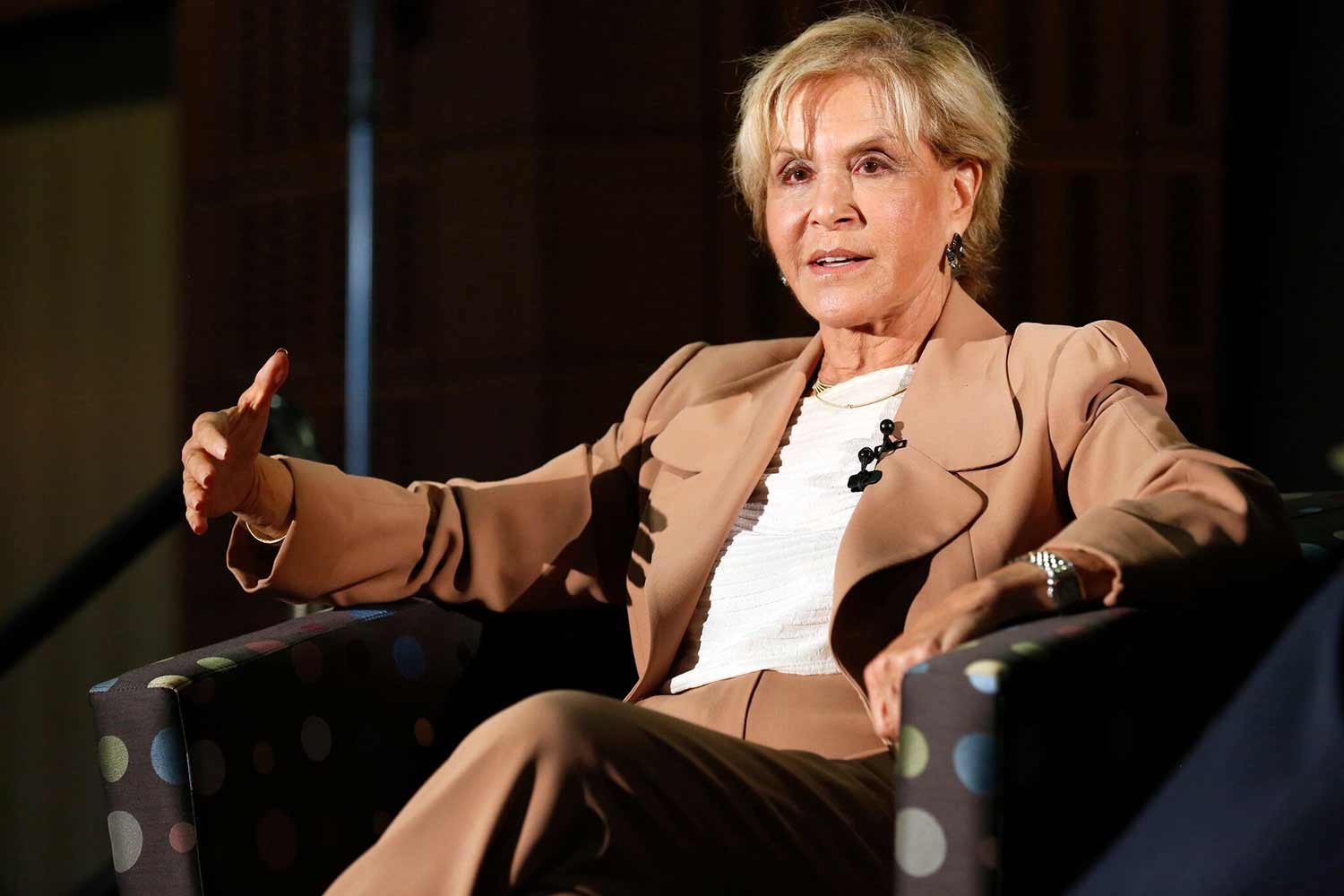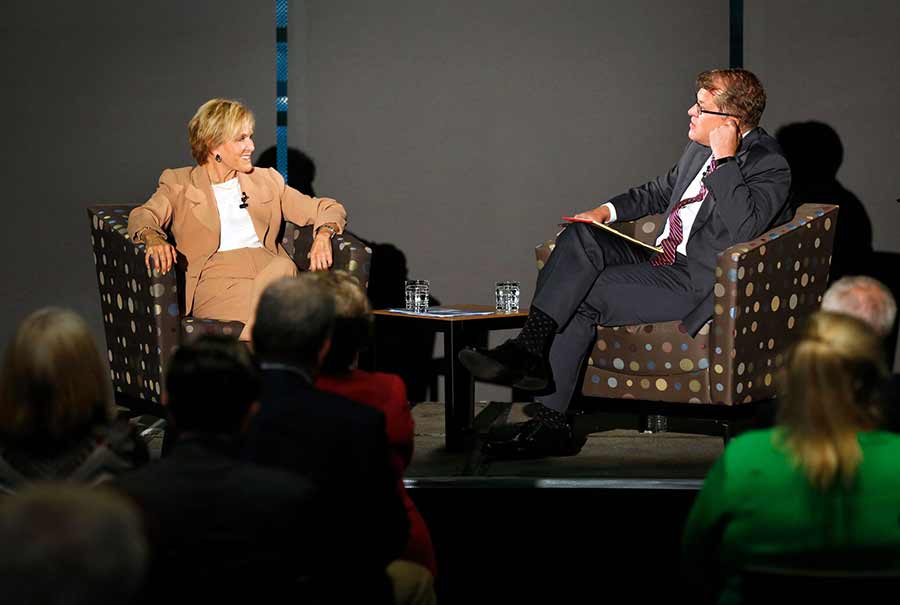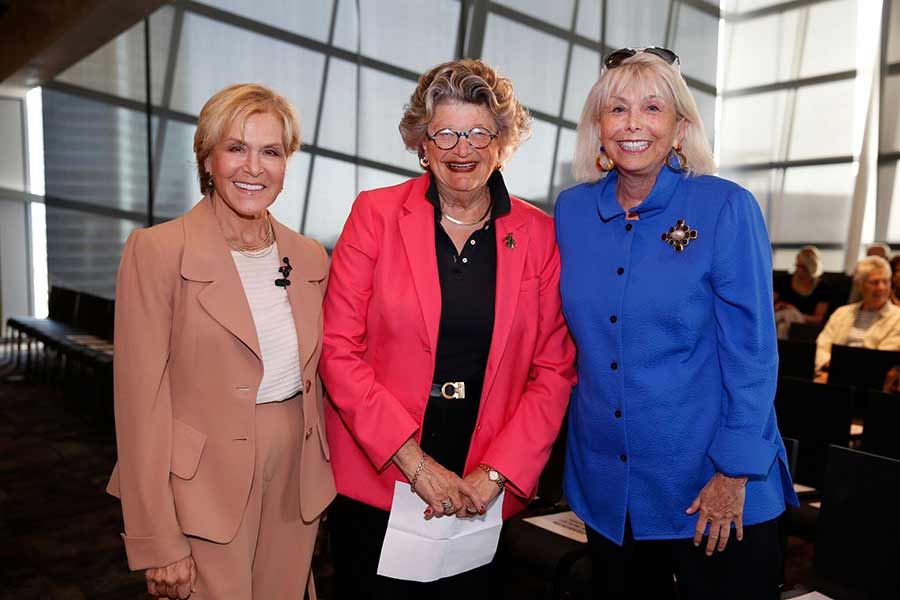
By:
- Jennifer Davies
Published Date
By:
- Jennifer Davies
Share This:

Agents of Change: How Universities Can Transform Urban Communities
When it comes to changing the world, universities must act locally—and boldly.
That is the message from Judith Rodin, former president of both The Rockefeller Foundation and the University of Pennsylvania, who has spent her career examining how universities can be the key drivers in developing cities that foster both equity and excellence.
“In today’s dizzyingly complex world, universities isolate themselves in an ivory tower at their peril,” she said. “In fact, understanding the role of universities in relation to their cities is going to be increasingly important.”
Rodin shared her experiences and insights on Oct. 2 with an audience of nearly 300 at the San Diego Central Library @ Joan Λ Irwin Jacobs Common as part of the Helen Edison Lecture Series, which UC San Diego Extension sponsored in conjunction with Bank of America. This lecture series aims to deliver on the university’s mission to contribute to the larger civic discourse.

Steven Clemons, editor-at-large for The Atlantic, and Dr. Rodin discuss the challenges in affecting change in urban communities.
Rodin’s presentation and conversation with Steve Clemons, editor-at-large for The Atlantic, was especially timely as UC San Diego has just embarked on building a new facility in downtown San Diego that is designed to better serve the larger community.
The 66,000-square-foot, four-story building, which is slated to open in 2021, will connect the university’s wide range of programs to the downtown innovation economy as well as to diverse neighborhoods throughout the city’s urban core. The new facility will be located at Park Avenue and Market Street, and the university chose the location because of its proximity to the upcoming UC San Diego Blue Line, a new trolley extension that will run from San Ysidro to University City and connect the main campus with the greater San Diego region.
Programming at the new building will include academic outreach and education for middle and high school students; business incubation and entrepreneurship resources; arts and culture events and exhibits; and research and volunteer opportunities for UC San Diego faculty and students to encourage greater civic engagement.
Mary Walshok, associate vice chancellor of public programs and dean of Extension at UC San Diego, said the new downtown facility delivers on Chancellor Pradeep K. Khosla’s Strategic Vision that values diversity and understands the university’s leadership role in the larger community.
“With the diverse neighborhoods surrounding the urban core, this new presence in downtown reinforces UC San Diego’s role as a key partner in spurring economic prosperity and inclusion,” Walshok said. “As we embark on this exciting new chapter, Dr. Rodin provided important insights on how the university can maximize this opportunity.”
Rodin said UC San Diego’s efforts in downtown would be a game changer for the campus and the city.
“It is commendable that, at this moment in its history, UC San Diego is systematically planning to help grow the urban core, investing in bringing its commitment to the innovation economy to downtown San Diego and developing a diverse talent pool that will benefit from and contribute to economic growth,” she said. “I salute Chancellor Khosla and Associate Vice Chancellor Walshok and welcome them to the fraternity of university leaders who have seized the opportunity and obligation to ask themselves what they could and should do for their city.”
This type of engagement, she added, will not only benefit the city but also the campus by better preparing students to interact with an increasingly interconnected world.
“Because a university like UC San Diego has the power to be a great agent of change, it must also serve as a model of civic engagement for its students,” Rodin said.

Dr. Rodin, pictured with Mary Walshok, associate vice chancellor of public programs and dean of Extension, and Lynn Schenk, UC San Diego Foundation Board trustee and former U.S. congresswoman, spoke to a crowd of nearly 300 at the San Diego Central Library @ Joan Λ Irwin Jacobs Common.
She knows of what she speaks because when Rodin took the helm of University of Pennsylvania in 1994, it was facing a serious set of challenges and opportunities as it worked to improve the urban communities surrounding the school.
“The blight of the local neighborhoods had become the plight of the university,” she said, describing how crime had soared, businesses and shops had closed, homes were abandoned and one in five residents lived below the poverty line. “We knew we could not have a future as a truly great university in a disintegrating community and economically weakening city, even if we were foolish enough to want such a thing.”
So University of Pennsylvania focused on five areas where it thought it could make the most impact. It worked to restore clean, safe well-lit and green streets; to provide high-quality, diverse housing choices; to revive commercial activity; improve local schools; and finally partner with city government, developers as well as startups and established companies to further economic growth. This translated into a number of initiatives from installing 1,200 lighting fixtures to planting 400 trees and 1,200 spring bulbs to opening a 300,000 square foot development that included a hotel, stores, restaurants and a movie theater.
“It has been a shot in the arm for the local economy,” Rodin said, adding that it made the area more attractive to local developers.
Rodin took the lessons from University of Pennsylvania with her when she joined The Rockefeller Foundation and championed its Resilient Cities initiative, working with cities around the globe from Barcelona to Berkeley to Bangkok to develop strategies to effectively handle not only the challenges of natural disasters, aging infrastructure and climate change but also meet social challenges such as creating an inclusive innovation economy.
From both roles, Rodin said she learned valuable lessons that might help UC San Diego as its work downtown unfolds. She said the university’s strategy must be realistic and comprehensive and based on collaboration and transparency. In addition, campus planning needs to be integrated with community development goals.
“You cannot plan your campus over here and plan your community development over there and hope to have an impact if you do not link the two in your thinking,” Rodin said.
While she stressed the need for patience and flexibility because “economic development and civic leadership is a journey and not a destination,” Rodin said the results are well worth the inevitable setbacks.
“Happily overtime these efforts don’t just transform your city, they challenge and capture the scholarly imagination of the faculty; and they become magnets for students who are excited by the ideas and passion this commitment represents,” Rodin said. “I urge you to push yourselves further than you first might have imagined because I have seen firsthand the opportunities for universities to do well for themselves by doing good in their urban core and local communities.”
Share This:
You May Also Like
Stay in the Know
Keep up with all the latest from UC San Diego. Subscribe to the newsletter today.


